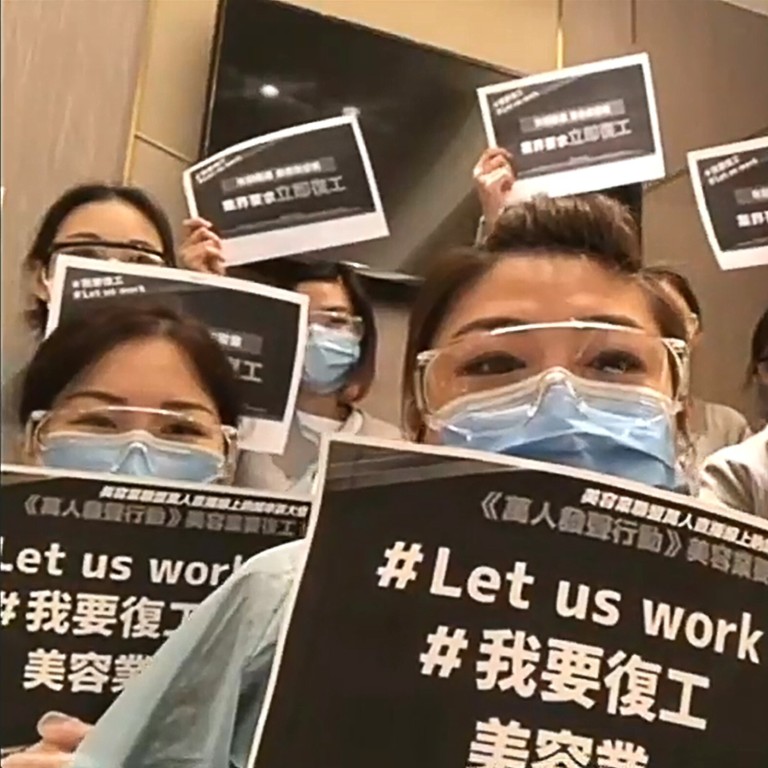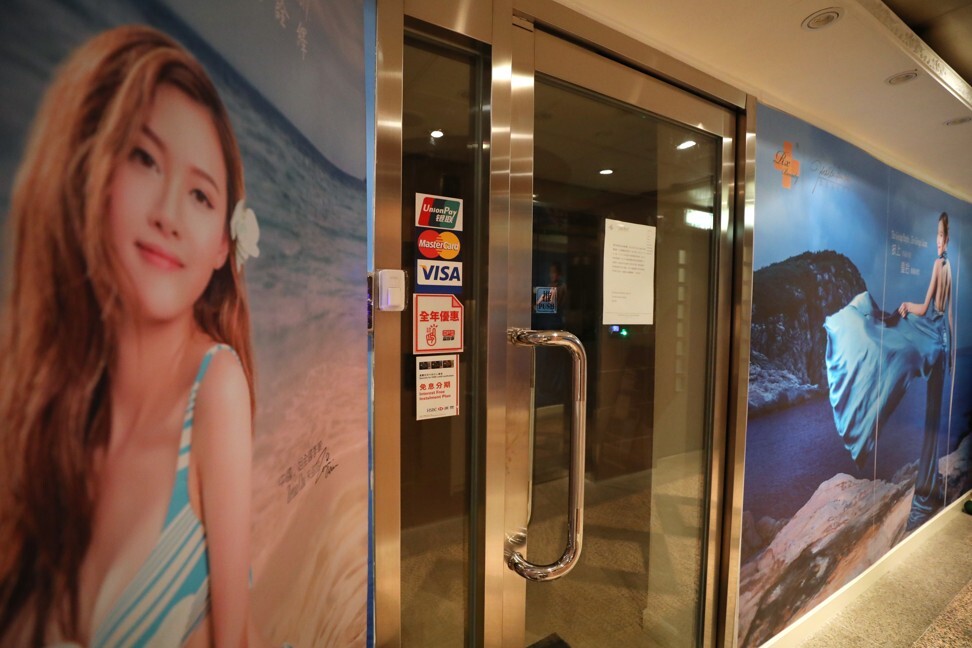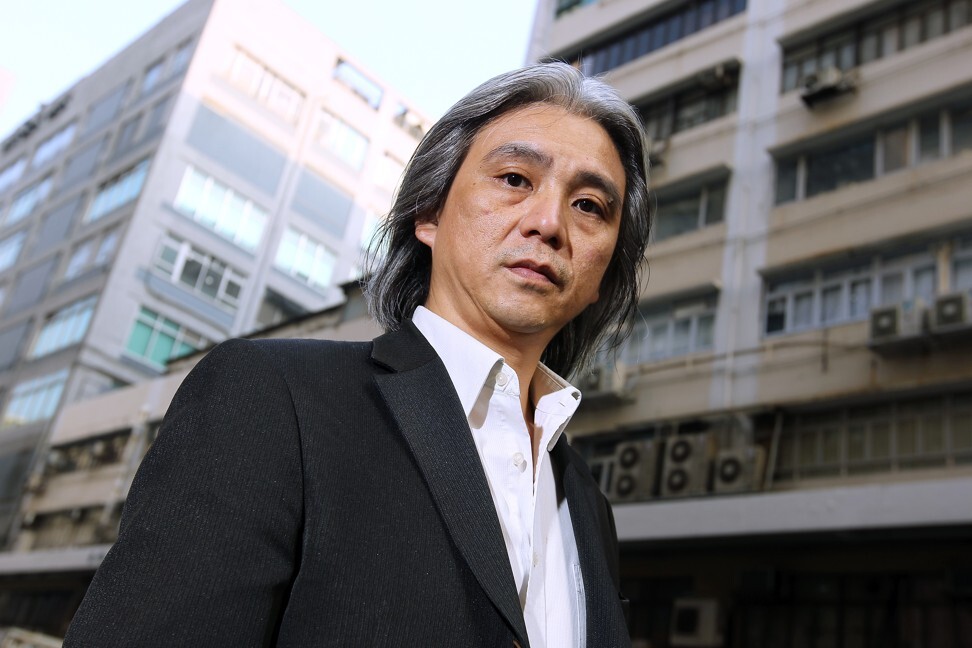
Coronavirus: industry boss urges Hong Kong beauticians to stop home visits, as workers skirt social-distancing rules to survive salon closures
- Federation of Beauty Industry appeals to members to follow the spirit of Covid-19 rules, which have forced salons to close for more than 100 days so far
- Beauty workers say they rely on home visits to eke out a living during the pandemic, with demand high for the treatments
Some practitioners say they are minimising infection risks by only serving clients in the same neighbourhood, but the head of the Federation of Beauty Industry has urged salons to abandon the visits and follow the spirit of the coronavirus restrictions.
Hong Kong beauticians protest against Covid-19 social-distancing rules
Fiona Chan, 28, a manicurist at a Central nail salon, said her clients were already asking for her contact details when Hong Kong recorded its first Covid-19 cases in January last year.
“The demand is big,” Chan said. “They don’t bother much about the prices. When I visit them, they feel like they’re seeing a lifesaver.”
The latest order for beauty businesses to suspend operations to help curtail the city’s fourth wave of infections took effect on December 10, with the policy extended to at least January 20.
About 10,000 beauty salon premises operate in the city, providing treatments ranging from skincare, manicures and pedicures to slimming services, according to the federation. Some 56,000 people work in the sector.
On Thursday, thousands of Hong Kong beauty industry workers vented their frustrations in an online protest, rallying against extended business closures and demanding the government allow operators to reopen so they could earn a living.
Chan said her monthly income of about HK$20,000 (US$2,580) dropped to zero when her salon was forced to close, prompting her to provide services at clients’ homes.
Hong Kong confirms 59 Covid-19 cases, cheaper quarantine hotels coming
Her customers are mostly middle-class expatriates who live across Central, Mid-Levels and Kennedy Town. She now earns HK$6,000 to HK$7,000 a month, or about HK$400 per appointment.
At their homes, the beautician and her customers wear masks throughout and all the tools are sterilised.
“Shopping at the [busy] Sogo department store is even more dangerous than providing services at clients’ homes, which are so big,” she said.
Another manicurist Winnie Chan, 28, said she was not keen on providing home services but had no choice given she must make a living.

Winnie Chan complained the long-running closures of salons were unreasonable, with all manicurists and their customers wearing masks for the duration of treatments.
Her monthly income in pre-pandemic days was about HK$20,000 a month. But her earnings from freelance jobs – mostly serving women who work in offices – are less than half that sum and involve more work.
“I have to go here and there and I have to carry a lot of tools and a machine,” she said.
Federation of Beauty Industry chairman Nelson Ip Sai-hung said he could not provide an estimate of how many workers offered treatments at clients’ homes, but strongly urged practitioners and customers to refrain from doing so.
Hong Kong Covid-19 sewage tests to be expanded, aim for ‘gold standard’
He described home visits as a grey area even though there were no specific rules banning the practice.
“The reason why parlours were ordered to close by law is to reduce face-to-face interaction and minimise infections,” Ip said.
In contrast to the high standards of protection at typical salons, it was difficult to control the hygiene environment in consumers’ homes, which could lead to cross-infections, he said.
Salon premises were thoroughly cleaned and customers asked to fill out a health declaration form for contact tracing, he added.
Ip called on the government to at least allow beauty salons to resume some limited services so that practitioners would not have to skirt the rules.

Jessie Leung, an IT worker in her 30s, booked at-home nail and spa treatments when her favourite parlours closed under social-distancing rules.
“I know it’s a bit frivolous to spend money on doing my nails during a global pandemic, while others have probably lost their job because of business closures,” she said.
She said the last time she had her nails done was on Christmas Eve at a friend’s flat, paying about HK$500 even though the manicurist arrived 30 minutes late and did not bring enough supplies and tools. After the treatment, Leung said the flat was thoroughly disinfected.
Leung said she still preferred treatments at licensed venues because beauticians had wider access to nail polishes, tools and sanitisation equipment at the parlours.

09:50
SCMP Explains: What's the difference between the major Covid-19 vaccines?
Infectious disease specialist Dr Joseph Tsang Kay-yan did not rule out cross-infections arising from home services, including beauty treatments, tutoring or even repair jobs.
While there was no silver bullet for eliminating all infection risks arising from social interactions, Tsang suggested a cautious approach to reopening businesses would minimise the risk of a further outbreak.


